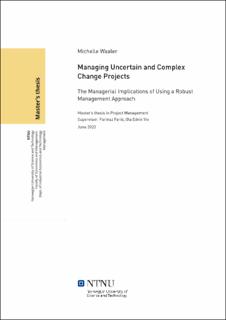| dc.description.abstract | Tidligere studier av en kombinasjon av prosjektledelse og endringsledelse, for bedre å håndtere transformasjonsendringer, har reist noen nye spørsmål om hvor godt en robust ledelsesmetode vil fungere under et høyt usikkerhetsnivå. Dette har rettferdiggjort en kritisk undersøkelse av hvordan robuste ledelsesmetoder kan påvirke utførelsesfasen av et endringsprosjekt. Dermed var målet med denne oppgaven å gi indikasjoner på hva som muliggjør og driver usikkerhet i utførelsesfasen av et prosjekt i et transformasjonsendringsprogram, og gi indikasjoner på hvilke implikasjoner dette har for en prosjektleder når en tradisjonell og robust ledelsesmetode benyttes.
En kritisk casestudie ble utført ved bruk av et tradisjonelt ingeniørfirma som for tiden er i utførelsesfasen av en transformasjonsendring. Studien identifiserte hvilke problemstillinger som er forårsaket av usikkerhet i transformasjonsendringsprosjektet i utførelsesfasen og hvordan disse problemene påvirker styringen av prosjektet med tanke på både måloppnåelse og ressursutnyttelse.
Bevisene som presenteres i denne oppgaven har vist at usikkerheten påvirker et tradisjonelt, robust prosjekt ved å introdusere flere problemstillinger i utførelsesfasen. Funnene indikerer at hovedproblemene forårsaket av usikkerhet er endringer i milepælene, ledelsesmetoden og prosjekt omfang, -fremdrift og -mål i utførelsesfasen. Videre antyder denne avhandlingen at kombinasjonen av et robust tankesett og usikkerhet forårsaker følgende problemer som påvirker prosjektets måloppnåelse og ressursutnyttelse. Først viser funnene flere endringer i milepælene og et behov for å utvikle et kompromiss i ledelsesmetoden i utførelsesfasen. Videre viser funnene hyppige evalueringer av nye muligheter, omplanlegging for å oppnå synkronisering i programmet, lange kontraktkonflikter og hindrende forhandlinger med entreprenøren og interne interessenter. I tillegg indikerer funnene at endringer og forsinkelser til robuste planer og beslutninger har en kulturell innvirkning på prosjektet. Analysen viser at dette kan føre til manglende tillit til robuste planer blant de ansatte i organisasjonen. Analysen indikerer videre at kulturelle spørsmål har innvirkning på driften i organisasjonen generelt. Spesielt viser funnene at usikkerhet og stadige endringer til robuste planer påvirker de ansattes oppfatning av planene og indikerer at robuste planer i en usikker kontekst kan føre til en falsk følelse av sikkerhet.
Videre konkluderer analysen og diskusjonen med at problemstillingene har følgende implikasjoner for endringsprosjektet. For det første er det funnet at kontraktsforhandlinger reduserer effektiviteten i prosjektet. For det andre demonstrerer spørsmålene om å håndtere et komplekst system av interne interessenter at motstridende synspunkter og misforståelser kan redusere effektiviteten hvis det ikke håndteres på riktig måte. For det tredje forårsaker gjensidig avhengighet i programmet problemer i prosjektet knyttet til omplanlegging. Følgelig er måloppnåelsen og ressursutnyttelsen avhengig av mengden ressurser som brukes på omplanlegging. Til slutt indikerer analysen at endringer og forsinkelser kombinert med en robust kultur og tankesett kan ha innvirkning på effektiviteten ved å skape insentiver til å ikke rapportere avvik fra fremdriften, og insentiver som er til fordel for prioritering av ressursutnyttelse foran kvalitet og måloppnåelse. | |
| dc.description.abstract | Previous studies of a combination of project management and change management, to better manage transformational changes, have raise some new questions as to how well a robust management approach will work when exposed to a high level of uncertainty. This has justified a critical research of how robust management approaches could affect the execution phase of a change project. Thus, the aim of this thesis was to provide indications to what enables and drives uncertainty in the execution phase of a project embedded in a transformational change program and provide indications to what managerial implications this have for a project manager when a traditional, robust management approach is used.
A critical case study was conducted using a traditional engineering company currently in the execution phase of a transformational change. The study identified which issues is caused by uncertainty in the transformational change project in the execution phase and how these issues affect the management of the project in terms of efficiency and effectiveness.
The evidence presented in this thesis has shown that the uncertainty impact a traditional, robust project by introducing several issues in the execution phase. The findings indicate that the main issues caused by uncertainty is changes to the milestones, approach, scope, progress and project output in the execution phase. Moreover, this thesis suggest that the combination of a robust mindset and uncertainty causes the following issues affecting the effectiveness and efficiency of the project. First, changes to the milestones, and the need for developing a compromise in the management approach. Moreover, frequent evaluation of emergent opportunities, re-planning to achieve synchronization in the program, lengthy contractual conflicts and halting negotiations with the contractor and internal stakeholders. In addition, the findings indicate that changes and delays to robust plans and decisions have a cultural impact on the project. The analysis show that this could cause a lack of trust in robust plans among the employees in the organization. The analysis further indicate that cultural issues have an impact on the operations in the organization in general as well as the effectiveness of robustness due to the uncertainty exposing plans as a false sense of certainty.
Furthermore, the analysis and discussion conclude that the issues have the following managerial implications on the change project. First, contractual negotiations is found to decrease the efficiency of the case project. Secondly, the issues of managing a complex system of internal stakeholders demonstrate that conflicting views and misunderstandings could decrease the efficiency if not managed appropriately. Third, the interdependence in the program causes issues in the case project related to re-planning. Consequently the effectiveness and efficiency is dependent on the amount of resources spent on re-planning. Lastly, the analysis indicate that changes and delays combined with a robust culture and mindset could have an affect on the efficiency by creating incentives to report misleading statements about the progress, or incentives which benefit the prioritization of efficiency ahead of quality and effectiveness. | |
